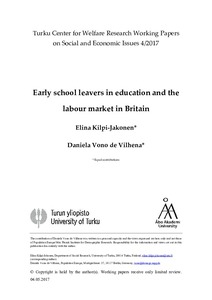Early School Leavers in Education and the Labour Market in Britain
Elina Kilpi-Jakonen; Daniela Vono de Vilhena
https://urn.fi/URN:NBN:fi-fe2021042718229
Tiivistelmä
Young people who have not completed an upper secondary qualification, i.e. early school leavers (ESL), are at a high risk of marginalization in today’s knowledge economies. The aim of this paper is to study this group in their 20s and early 30s to analyse their participation in learning and whether participants benefit from their learning in terms of improved employment outcomes. We use longitudinal data from the British Household Panel Survey (BHPS) for our study.
We find that, in general, adult learning perpetuates inequalities within the group of early school leavers. Even within this disadvantaged group, participation is more likely for those who are relatively advantaged in terms of social class origin, prior education and employment. Non-formal learning is found to improve earnings but not employment chances. New qualifications that do not lead to exit from ESL status have an uncertain impact. Exit from ESL status tends to increase both employment chances and earnings.
We conclude that returning to education is advantageous for early school leavers, particularly when they are able to achieve a full upper secondary education or above. However, second-chance education does not reach the most disadvantaged early school leavers as effectively as it does the less disadvantaged.
Kokoelmat
- Rinnakkaistallenteet [19218]
